Contemporary
- Notker Füglister (1931-1996), Catholic theologian
- Notker Wolf (born 1940), the ninth Abbot Primate of the Benedictine Confederation of the Order of Saint Benedict
Notker or Notger is a masculine Germanic given name. It may refer to:

The Abbey of Saint Gall is a dissolved abbey (747–1805) in a Catholic religious complex in the city of St. Gallen in Switzerland. The Carolingian-era monastery existed from 719, founded by Saint Othmar on the spot where Saint Gall had erected his hermitage. It became an independent principality between 9th and 13th centuries, and was for many centuries one of the chief Benedictine abbeys in Europe. The library of the Abbey is one of the oldest monastic libraries in the world.
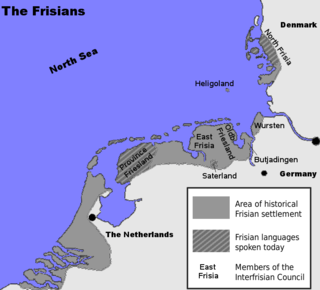
Year 810 (DCCCX) was a common year starting on Tuesday of the Julian calendar.
Anselm may refer to:

Gall according to hagiographic tradition was a disciple and one of the traditional twelve companions of Columbanus on his mission from Ireland to the continent. However, he may have originally come from the border region between Lorraine and Alemannia and only met Columbanus at the monastery of Luxeuil in the Vosges. Gall is known as a representative of the Irish monastic tradition. The Abbey of Saint Gall in the city of Saint Gallen, Switzerland was built upon his original hermitage. Deicolus was the elder brother of Gall.

Notker the Stammerer, Notker Balbulus, or simply Notker, was a Benedictine monk at the Abbey of Saint Gall active as a composer, poet and scholar. Described as "a significant figure in the Western Church", Notker made substantial contributions to both the music and literature of his time. He is usually credited with two major works of the Carolingian period: the Liber Hymnorum, which includes an important collection of early musical sequences, and an early biography of Charlemagne, the Gesta Karoli Magni. His other works include a biography of Saint Gall known as the Vita Sancti Galli and a martyrology, among others.

April 5 — Eastern Orthodox liturgical calendar — April 7
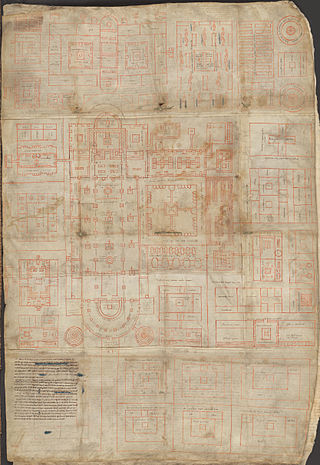
The Plan of Saint Gall is a medieval architectural drawing of a monastic compound dating from 820–830 AD. It depicts an entire Benedictine monastic compound, including churches, houses, stables, kitchens, workshops, brewery, infirmary, and a special house for bloodletting. According to calculations based on the manuscript's tituli the complex was meant to house about 110 monks, 115 lay visitors, and 150 craftmen and agricultural workers. The Plan was never actually built, and was so named because it is dedicated to Gozbert abbot of Saint Gall. The planned church was intended to keep the relics of Saint Gall. The plan was kept at the famous medieval monastery library of the Abbey of St. Gall, the Stiftsbibliothek Sankt Gallen where it remains to this day.
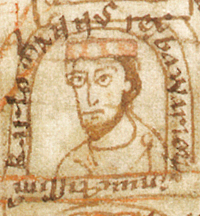
Notker Labeo, also known as Notker the German or Notker III, was a Benedictine monk active as a scholar and teacher. He was the first commentator on Aristotle active in the Middle Ages and translated the works of earlier Latin writers such as Boethius and Martianus Capella. Notker is also attributed the authorship of five short essays on music.
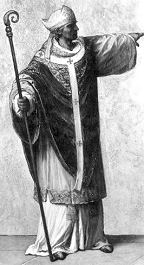
Notkerof Liège was a Benedictine monk, bishop (972–1008) and first prince-bishop (980–1008) of the Bishopric of Liège.
Ekkehard IV was a monk of the Abbey of Saint Gall and the author of the Casus sancti Galli and Liber Benedictionum.
Ekkehard is a German given name. It is composed of the elements ekke "edge, blade; sword" and hart "brave; hardy". Variant forms include Eckard, Eckhard, Eckhart, Eckart. The Anglo-Saxon form of the name was Ecgheard, possibly attested in the toponym Eggerton.
Notker Physicus was a monk at the Abbey of Saint Gall, active as a physician, painter, composer and poet. He is best known for his medical prowess, and may have been physician to the Holy Roman Emperors Otto I and Otto II.
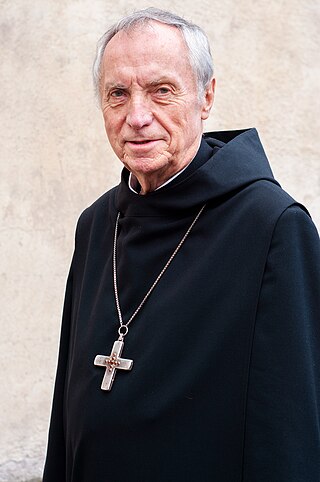
Notker Wolf was a German Benedictine monk, priest, abbot, musician, and author. He was a member of St. Ottilien Archabbey located in Bavaria, Germany, which is part of the Benedictine Congregation of Saint Ottilien. He served as the ninth Abbot Primate of the Benedictine Confederation of the Order of Saint Benedict from 2000 to 2016. He was known as the "rock abbot", for playing flute and sometimes e-guitar with the rock band Feedback in concerts and recordings.

Tuotilo was a Frankish monk at the Abbey of Saint Gall. He was a composer, and according to Ekkehard IV a century later, also a poet, musician, painter and sculptor. Various trope melodies can be assigned to Tuotilo, but works of other mediums are attributed with less certainty. He was a student of Iso of St. Gallen and friends with the fellow monk Notker the Stammerer.
Saint Clement of Ireland (Clemens Scotus) (c. 750 – 818) is venerated as a saint by the Catholic Church.
Ekkehard II, called Palatinus, was a monk of the Abbey of Saint Gall who became known for his sequence poetry.
Heriward was the second abbot of Gembloux from 987. He succeeded his brother, Erluin I.
Notker was the abbot of the Abbey of Saint Gall from 971 to 975. Notker was recommended for the office of abbot by his predecessor Purchart I. His election occurred on 18 May 971. He was the nephew of Abbot Thieto and Abbot Craloh as well as of Notker the Physician.
Purchart was abbot of the Abbey of Saint Gall from 1001 to 1022.
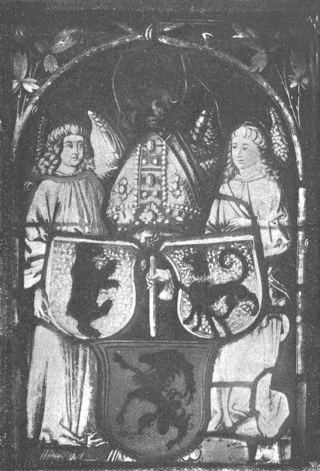
Franz von Gaisberg was librarian from 1491 to c. 1496 and abbot of the Abbey of Saint Gall from 1504 to 1529.